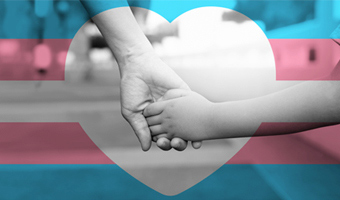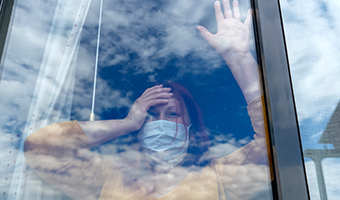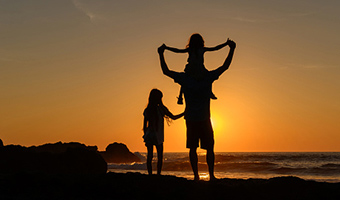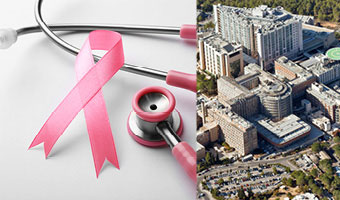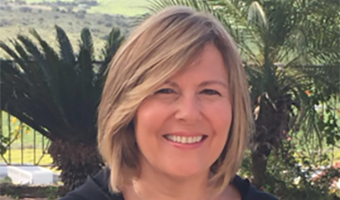
In 2016, Tamar Lesnick – a New Jersey native who began having heart problems after she made aliya a few years earlier – became a patient in the Linda Jay Pollin Cardiovascular Wellness Center at Hadassah Hospital. "At the center I met with a totally encompassing group of professionals who dealt with my [complex] heart issues, directed me to a menopause specialist in the hospital that worked directly with my cardiologist, physical therapist, dietician and psychologist. I felt that every aspect of my health was simultaneously being addressed. After three months … I felt great, and all my energy came back."
Today, she is working with Pollin Center staff to help inform medical professionals about the unique symptoms for women’s heart issues and to raise awareness among women in their 40s about cardiovascular disease and menopause. Her hope is that, “by promoting awareness and risk factor screening, preventive measures can be taken to minimize cardiovascular disease and increase behavior that promotes cardiovascular wellness.” And that means more heart healthy women!
Three Tips from Tamar Lesnick
- Listen to your body.
If you are in pain, your body is telling you something. It is crucial that you find the cause of the pain and deal with it. Not just to improve your quality of life, but to prevent a potentially dangerous health situation. - Comprehensive medical supervision is critical.
It is not enough to see an expert in connection with one symptom. Especially for women in their 40s and 50s, it’s crucial to have a physician who can oversee and evaluate all aspects of a woman's health. - Knowledge is power.
One in five women under age 55 don't even experience chest pain with heart attacks. Knowing what issues affect women during different phases of their life as well as symptoms of heart conditions in women (which differ from men) can help save your life or the life of a friend or family member. It is so important that you know if you have any risk factors and, if you do, to get help taking the necessary preventative measures.
From Spin Class to Cardiology Tamar’s Story
No one saw it coming. Yet looking back, the signs were all there.
Looking at Tamar Lesnick, you'd never suspect this athletic school administrator could have heart problems. A vivacious mother of five, Tamar lights up a room – she’s the kind of woman you’d be hard-pressed to keep up with in spin class.
The New Jersey native was living in Teaneck, working and exercising and parenting. During a routine blood test, her cholesterol, triglycerides and blood pressure came out high. Her doctor prescribed statins.
Says Lesnick, “I was having muscle pain and feeling tired, but I was lax in taking them, assuming the medications and peri-menopause were the cause of my achiness and hot flashes.”
Like many women, she thought of heart problems as an older man clutching his chest. But age, chest pain and gender are no longer the sole predictors of heart disease. One in five women under age 55 don't even experience chest pain with heart attacks.
The Lesnicks fulfilled a life dream and moved to Israel. That's where she was living in January 2014 when she experienced her first mild chest pains. She went for an electrocardiogram and wore a heart-monitoring halter for 24 hours. Neither showed irregularities. A few months later, she had more intense chest pains. A second EKG confirmed the first: no damage to her heart.
In October, she began having a pain in her jaw. The pain in her chest then moved to her right side and down her arm. “Everyone knows that the heart is on the left side, so I ruled that out,” said Lesnick. “What do you do when you have a pain in the mouth? I went to a dentist and then an oral surgeon and finally to a TMJ [throat, mouth and jaw] specialist. They shrugged. The pain was idiosyncratic. My teeth and gums and jaw were okay. They said I shouldn't worry.”
Everyone chalked it up to stress. Lesnick turned to physical therapy and sport massage to alleviate her upper body pain, but they only briefly. Her pain resumed the next day.
With a clear bill of health, Lesnick began feeling pressure in her head in December 2014. She stopped doing three spin classes a week, switching to low-impact exercise. But she still felt a heaviness in her chest and shortness of breath.
“I thought maybe it was the cold air, maybe I started too quickly. You'd be surprised at how you can rationalize away problems."
Her husband suggested a vacation. An exercise devotee, they used the hotel gym. "I was just walking on the treadmill when I felt the infamous elephant on my chest. But it subsided when I stopped exercising. I tried to ignore it – so we went to a museum. Then the pressure set in again, while we were just walking in the museum. All the time I had radiating pain in my right side of the chest and arm, like someone was tying a tourniquet around my arm.
She called her doctor, who suggested the emergency room. Lesnick didn’t want to ruin her vacation, so she opted to “go out for dinner and see how I felt then."
At the restaurant, she couldn't make it up the steps, so they headed to a walk-in health center. An EKG showed no abnormalities. But then Lesnick shared her family history. Her maternal grandfather had died at age 61 of a heart attack. Her father's mother also had a heart condition. Her dad had two strokes at age 65.
"The physicians at the drop-in clinic heard the history, and notwithstanding that the EKG and a troponin test didn't show anything, they immediately sent me to the hospital by ambulance.
In the hospital the cardiologist … was concerned that the tests might not be conclusive.The cardiologist found a 99% blockage in left anterior artery to the heart and inserted a stent. He saw two other blockages that might be treated in the future.
"I felt relief from the intense pressure right away and believed that now my arteries were clean and in a few weeks everything would be back to normal. Unfortunately, within a few days, strong radiating pain resumed."
In the end, Lesnick had three additional stents inserted and was diagnosed with small vessel disease, a condition in which the walls of the small arteries in the heart are damaged with symptoms similar to heart disease, including chest pain. She was treated with nitrates.
While her heart was being treated, she was coping with fogginess, hot flashes and night sweats. "No one warned me about the symptoms or told me anything about peri-menopause that can occur for five years before you reach menopause. I was so frustrated. I had to check with cardiologists whether I can take hormone replacement therapy. I was in desperate search for a support system and the need to spread the importance of knowing women's heart attack symptoms."
One night in August 2016, severe chest pains woke her up twice in the same night. At the hospital, she was diagnosed with endothelial dysfunction –an imbalance with the dilating and constriction of the blood vessel. In addition the doctors found that I have myocardial bridge, a band of heart muscle that lies on top of a coronary artery, instead of underneath it and can result in spasms of the artery and the same sensation as the blockage of an artery.
In 2016, living with such complex heart disease, Lesnick became a patient in the Linda Jay Pollin Cardiovascular Wellness Center at Hadassah Hospital. "At the center I met with a totally encompassing group of professionals who dealt with my heart issues, directed me to a menopause specialist in the hospital that worked directly with my cardiologist, physical therapist, dietician and psychologist. I felt that every aspect of my health was simultaneously being addressed. After three months on the estrogen patch and progesterone, I felt great, and all my energy came back."


